Please Take Note: This is a review of the final game, but it might change slightly based on the success of the Kickstarter campaign. The game is being reviewed on the components and the rules provided with the understanding that “what you see is not what you might get” when the game is published. If you like what you read and want to learn more, we encourage you to visit the game publisher’s website or visit the Kickstarter campaign. Now that we have all that disclaimer junk out of the way, on with the review.
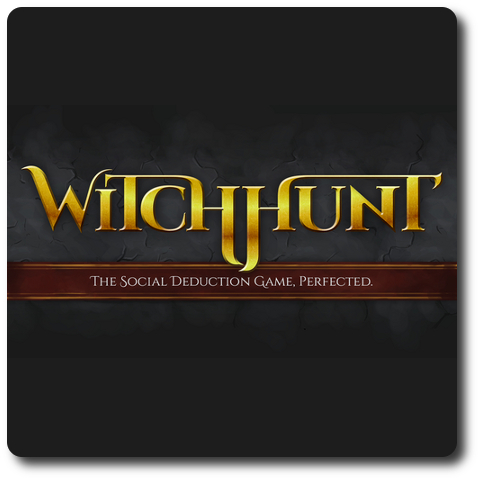
The Basics:
- For ages 7 and up (publisher suggests 13+)
- For 7 or more players
- Variable game length
Geek Skills:
- Active Listening & Communication
- Logical & Critical Decision Making
- Emotional Coping Skills
- Memorization
- Strategy & Tactics
- Cooperative & Team Play
- Self-confidence
- Bluffing and Misdirection
Learning Curve:
- Child – Moderate
- Adult – Easy
Theme & Narrative:
- A small village is plagued by witches; let the burning begin!
Endorsements:
- Gamer Geek mixed!
- Parent Geek mixed!
- Child Geek rejected!
Overview
In a small village where everyone knows each other and their business, social harmony is always at risk. All it takes is a small spark to ignite a raging fire of discord and distrust. In this village, where you have dwelt all your life, evil is taking root. Witches have moved in and now work to unravel the social fabric of your home. You must find them before they find you.
WitchHunt, designed and self-published by Kyle Brockman, will reportedly be comprised of 22 Character cards, 22 Team cards, and an unspecified number of Reference cards. The cards come in two sizes: standard and jumbo. The standard card size is meant to allow for easy dealing of cards, while the jumbo sized cards are reserved for quick reference, visible to everyone in the game. A nice touch. As this is a review of a prepublished game, I cannot comment on the component quality. Laura La Vito did an excellent job of illustrating the different characters, adding unique detail and bringing the cards to visual life.
Note: My copy of the game did not come with a rule book, although the rules are provided online. The game will have an accompanying Moderator app, but that too is not fully completed. This left us wondering about a few of the rules and some gaps were never filled in. To that end, the game rules summarized here should not be taken as complete, nor should the game play described here be seen as fully explored. There are many variables, special powers, and conditions in the game that make every game playing session different and unique. Having finished around 10 games myself, I still don’t think I fully “get the game” as of yet.
Preparing for the Hunt
To set up the game, first determine which player will be the Moderator. This need not be the most experienced or oldest player in the group, but until everyone is familiar with the game, it really should be. The Moderator has two jobs. First, prepping the game prior to play and second, keeping the game going. They do not actually play the game, however, and act as a guiding and governing force. Think of them as something like a Game Master or Dungeon Master in a role-playing game. They describe and present, while the players act and discuss.
Second, separate the Team and Character cards into two piles. Shuffle each pile separately. The Moderator should remove cards as needed, keeping track of what cards are in play.
Third, deal to each player 1 Team card and 1 Character card. Players should keep these cards hidden until told to reveal them. Note that some of the Character cards, the “Fortune Teller” Character card, for example, requires a bit of additional set up. The Moderator of the game should familiarize themselves with each character and complete any preparation tasks prior to playing the game for the sake of keeping everyone involved.
Fourth, if using the jumbo cards (which is optional), place 1 copy of each jumbo card that matches a standard card in play. The jumbo cards should be placed face-up and be visible to everyone. The best place is in the middle of the table or playing area. If playing with a lot of people, the jumbo cards will most likely be placed on the floor. The jumbo cards are for reference purposes only, but can be taken by the players for closer inspection at anytime during the game. If the players are familiar with the Character card abilities, the jumbo cards are not necessary. I highly recommend you use them until everyone is very familiar with the game.
Forth, place the unused cards back into the game box and kept hidden from all the players.
That’s it for game set up. Time to find the witches!
A Cursed Town
Each player will be given a Character card and a Team card. These cards are summarized here. The Moderator should summarize the Character powers and take any player aside if they have questions regarding their role prior to play.
Character Cards
All Characters have a special ability that falls into four main categories. These are Offense, Defense, Information, and Holy.
Offense special abilities are used to attack other players in the game. The goal is to attack a witch, but that’s only true if the player is not a witch. If the player is a witch, they can use the special ability to remove other players. Which might look suspicious and draw unwanted attention.
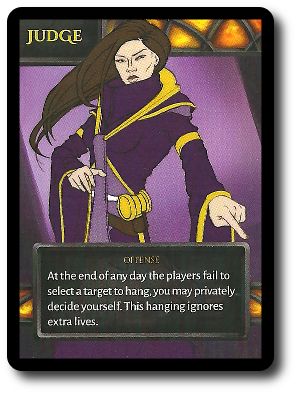
Defense special abilities are used to redirect or block attacks. These special abilities help the player survive the game. For example, most players will be given a Character with only 1 Life, which is to say, they can only be targeted once which will result in the Character being considered “dead”. The “Survivalist” Character card is given 2 Lives, allowing them to be targeted twice before they expire.
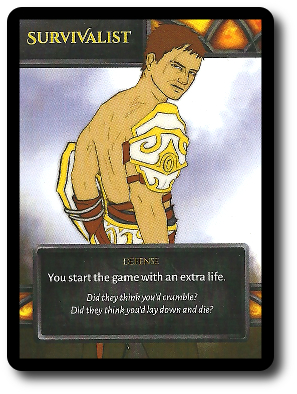
Information special abilities allow the player to learn more about their opponents than what is readily available to the masses. The player will be able to dig deeper into the unknown and discover some unsettling facts about their opponent’s Characters and possible allegiance. But not all information gathered is complete and nothing is for certain. A player might also inadvertently bring about a lot of negativity from other opponents if they are found to be a bit too nosy.
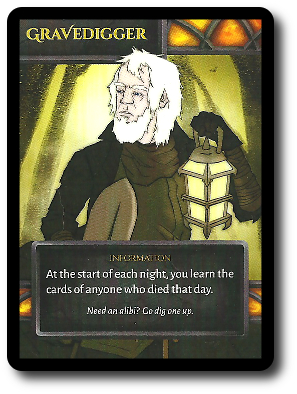
Holy special abilities allow the player to learn who is and who is not a witch. This is an extremely powerful special ability that will most likely get the player’s Character killed very quickly if they are found out. Witches like to remain anonymous and if they learn that there is a player who can see through their disguise, they will do all they can to remove them from the game.
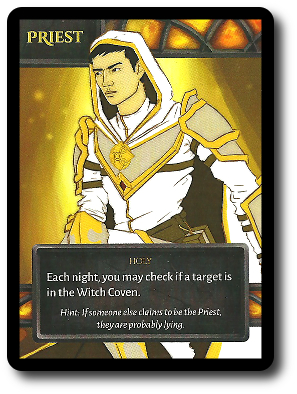
Team Cards
There are essentially 2 teams in the game. These are the Village People (*snicker*) and the Witch Coven. The Team cards identify which team the player is on and what their goal is. A player’s team affiliation is not revealed during the game (unless another card suggests otherwise), meaning the player should not announce who they are loyal to. In fact, players associated with the Witch Coven must do all they can to remain hidden among the “normal” people.
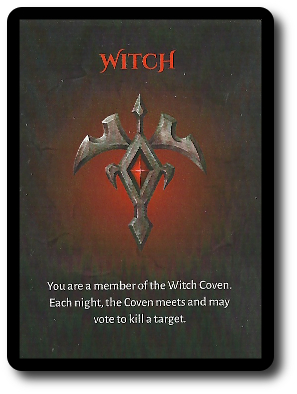
The Village People are doing all they can to seek out, identify, and burn the hell out of the witches (figuratively speaking). The trouble is, those pesky witches are tricky and do a great job of looking like everyone else. From a player’s perspective, their best friend and neighbor could be a witch. Which is completely possible. All the witches know each other during the game, but the Village People are completely ignorant. At least at first. Using Character special powers, asking questions, listening to conversations, and observing other players will help the Village People root out the evil that plagues their home and threatens their safety. And if a few innocent people get killed along the way, so be it. It’s all for the good of the whole.
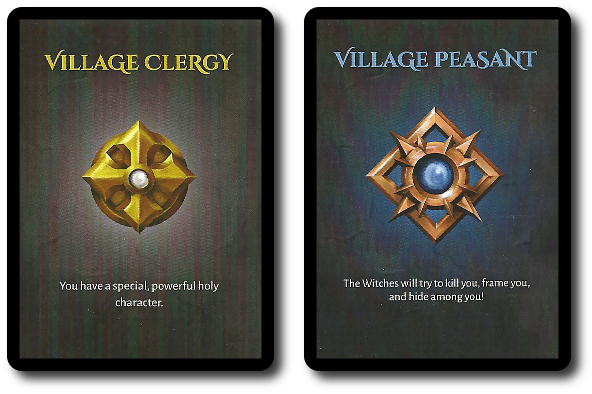
Angels and Demons
Players are not removed from the game when their Characters are hung or burned alive. Instead, they turn into an Angel or a Demon. These are special roles the player now takes on and they use them to further the goals of their team. Angel and Demon players get to watch the action in both the Day and Night phase, seeing who is doing what, while quietly judging.
Demons pick 2 target players still in the game to “Haunt”. This causes confusion for a player who is attempting to determine which team an opponent is on. A haunted player will give a false read, in other words. When a player uses a special ability to determine team allegiance, they will get the allegiance of the other player who is haunted. The Angels may protect 1 player in the game, saving them from any and all attacks by the Witch Coven during the Night phase. The only restriction to the protection provided by the Angels is limited by the Demons’ haunting other players. Angels and Demons can stand in each others way, but are unable to directly block the living or the dead indefinitely.
A Hunting We Will Go…
WitchHunt is played in rounds. Each round is divided into a Day and Night phase. The Moderator keeps the game going and times each phase, if needed, making sure no phase lasts longer than necessary. The Moderator is the “boss” of the game and their commands and judgement calls must be obeyed.
During each round, players can use their special abilities once. Some can only be used at certain times and a few can only be used once per game. Timing is important. The Moderator will assist in the resolution of special abilities.
Day Phase
The first phase of the game begins on a quiet morning that looks to be the start of a beautiful day. It’s not. All the players are informed that strange things are at work that can only be the result of a witch or witches. The goal is simple. The witches must be found and dealt with. The survival of the village depends on it.
The players must now vote who they will hang (or burn) based on nothing other than hearsay and conjecture. Later in the game, they will have something to go on and can debate who they think should or should not be sent to the gallows. The Moderator should allow the players time to discuss, debate, argue, and yell. A normal Day phase lasts around 5 to 8 minutes. If the players cannot provide a majority vote, the player who has the “Judge” Character can make the final call who is removed from the game.
Any player who is the unfortunate recipient of a majority vote or if a player volunteers their Character to be hung, are removed from the game as active participants, but their cards are NOT revealed. The removed player is now an Angel or a Demon, depending on their team.
Night Phase
During the Night phase, all the players lower their heads and close their eyes. Everyone is asleep. The Moderator now announces a Character role and tells them to wake up and take their action. This must be done in silence, but the awake players can look at each other, gesture, and node or shake their head. There is a specific order in which the Character roles during the Night phase must be called. It typically goes as follows: Gravedigger, Demons, Angels, Witch Coven vote (for the kill), Priest, Inquisitor, Bomber, and then Watchman.
The Demons, Angels, and Witch Coven take votes, while the other roles point to their player target. After each group or player has taken their action, they are told to go back to sleep and the next group is told to awaken to take their action.
At the end of the Night phase, the Moderator tells everyone to wake up and announces what happened based on the results of the actions and votes taken during the Night phase. More than one player could wake up to find that they are now singing with the Angels or plotting with the Demons.
This ends a round of game play. A new round now begins starting with the Day phase.
The End or Beginning of Torment
The game continues until one team wins. The Village People win if they kill all the members of the Witch Coven. The Witch Coven wins if there is ever a tie or a stalemate. Angel and Demon players will win or lose the game based on which team wins, meaning that players who are removed from the game as a Character, still very much have a stake in the game.
Game Variants
There are several game variants available if the Moderator and players want to use them. However, it’s important to note that the game already lends itself easily to any House Rules and various changes the players want.
Last Stand
This game variant allows the last two team members who belong to the Witch Coven to remove 2 players during the Night phase instead of 1.
The Bomb
Used only if the “Bomber” Character card is in play, this game variant allows a player to secretly assign another player as the “Bomb”. The “Bomb” however, is publicly shown by the player who it’s given to. At the end of the Day phase, the “Bomb” is passed to any other opponent the player likes, even if they were removed from the game during the vote or through witchcraft. The player with the “Bomber” Character can detonate the “Bomb” at the end of the Night phase, removing the player who is holding it, sending their Character to Heaven or Hell. This is a one time use special ability and the “Bomb” is removed from the game after being detonated.
To learn more about WitchHunt, visit the game publisher’s website or visit the Kickstarter campaign.
Final Word
The Child Geeks understood how the game was played (being well versed with a number of different social deduction games), but failed to grasp WitchHunt. The game is easy enough to teach, but the many different actions and possibilities proved to be too much for all but the most experienced of Child Geeks. According to one Child Geek, “I really like the idea of the game, but it’s too hard too play. I keep losing track of who is doing what and what I can or cannot do.” Another Child Geek said, “I’d rather play Werewolf. It’s simpler and easier to understand.” It was obvious from the very start that there was “too much game” in WitchHunt, causing new players to wilt before our eyes and casual players to get frustrated. Only a few of the Child Geeks, who turned out to be very good at social deduction games to begin with, enjoyed themselves. One of these Child Geeks said, “This is the best game ever! There is a lot more to think about and do!” Towards the end of all our games, the Child Geeks just wanted to be Angels or Demons, finding these roles to be much easier to manage. The final vote for the game resulted in the majority of Child Geeks rejecting WitchHunt.
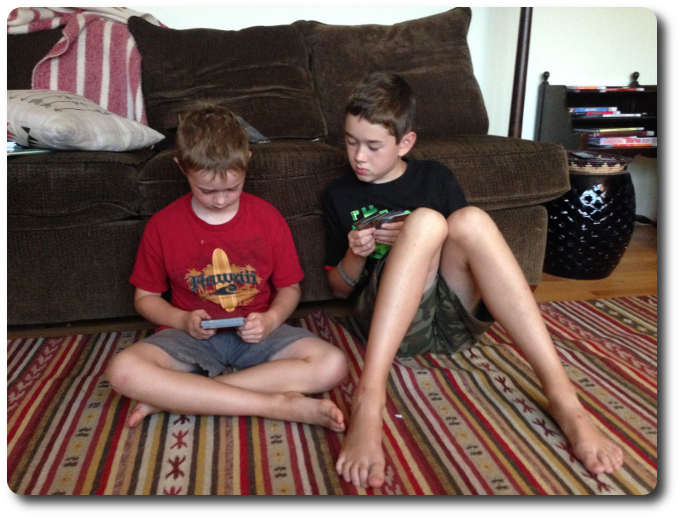
My two oldest little geeks reviewed the Characters again and again in preperation to play the game … it didn’t help
The Parent Geeks closely paralleled their younger counterparts. While the game did not polarize our players, it quickly broke them up into 3 different camps. Those who disliked and were highly confused by the game, those who thought it was OK, but too much work, and those who loved it. Out of the last group, the Parent Geeks who enjoyed social deduction games and played them every chance they got, WitchHunt was found to be excellent. According to one such Parent Geek, “This game is exceedingly complex. There are so many more levels to it than what you might think can exist in a social deduction game. I think it’s brilliant.” A Parent Geek who found the game to be mediocre said, “I neat idea, but too much is being thrown into it. It’s like the designer sat down, scribed all he didn’t like about other games, and threw them into this one.” Finally, a Parent Geek who didn’t like the game said, “I have no idea what this game is about, how it is supposed to be played, and what the Moderator is trying to tell me to do. No thanks. I’ll stick to other games.” The final vote from the Parent Geeks resulted in mixed approval, where those Parent Geeks who already enjoyed social deduction games fell in love and those who did not run away.
The Gamer Geeks are no strangers to social deduction games and quickly grasped the game’s concept, goal, and game play. They seemed to thrive in this game, but found the role of the Moderator to be too important. According to one Gamer Geek, “The biggest – and really only – problem this game has is that it is entirely too dependent on having a solid Moderator. If you don’t, the game falls completely apart.” A number of other Gamer Geeks said the same thing, remarking how easy it would be to make WitchHunt into a horrible experience simply because the Moderator didn’t know what they were doing. Another Gamer Geek said, “The game is not as tight as it should be. I think after playing it several times a player and moderator wouldn’t have a problem, but the game really drags with new players.” Finally, another Gamer Geek said, “A solid game that seems to struggle a bit underneath its own weight and ambition. I think this game sets a new standard for social deduction games, but I am uncertain if the new standard was ever needed.” The final vote from the Gamer Geeks resulted in mixed approval. Roughly half of the Gamer Geeks found the game to be a brilliant mix of the old and the new, expanding on classic game play, and developing new methods of play in the process. The other half did not, finding the game to be too clumsy at times, too prone to failure due to complex game play and untested Moderators, and a seemingly needless level of player interaction at multiple levels that could not be stopped or hindered.
WitchHunt is, in my opinion, an attempt to fix what some might consider flaws in the classic social deduction game, Are You a Werewolf? Whether this game is for you or not will depend on if you believe other social deduction games are lacking certain game mechanics. WitchHunt is a fresh take on an old game, although it does blaze its own trail and establishes itself as a unique game in its own right, albeit heavily built on the shoulders of its predecessors. I enjoyed the game, but found it much more involved than I originally expected. The Character special abilities add a great deal of depth, tactics, discussion, and strategic game play. So much, in fact, that I would caution introducing WitchHunt to a large group of new players. While I would not suggest there is too much going on, managing all the Character special abilities as a new Moderator or as a veteran Moderator can be a lot of work. WitchHunt is not a terribly difficult game to learn, but it can be a real bugger to grasp. Like all social deduction games, the real challenge is the meta game going on under the covers, determining who is lying, who is telling the truth, and where the secret cabals may lie.
The game comes with a Moderator app, which is still in development (I believe), but works very well. In fact, too well, which concerns me. Due to the many different special Character abilities, actions, and reactions, the game lends itself easily to a spreadsheet, lists, and roll calls. I rather dislike this approach and it makes me even more concerned about the game’s rule book. There are a lot of things a Moderator must remember, to manage, to track, and to follow-up on that cannot be easily described or documented. I’ve played the Moderator several times and I found the game to be a mix of fun and hellish frustration. The Moderator app is not only going to be useful, but I’m afraid it’s going to be absolutely necessary. Which brings up an important point…
If the Moderator is not skilled or familiar with the game, no one is going to have fun. In other social deduction games, the Moderator can wing it or back things up a bit. Not the case in WitchHunt. If the Moderator doesn’t know the game inside and out, the game is going to fail. A Moderator must be quick on their feet, detailed orientated, and very good at keeping track of many changes. Not the case for the players, thank goodness. The players have a much easier time of it.
WitchHunt is not an easy game. It’s complex, multi-layered, and prone to jumping off its own tracks if not moderated properly. It is, in many respects, a juiced up and immensely buffed version of other social deduction games. If WitchHunt was on the beach, it would be the person pumping iron in a speedo shouting at anyone who passed by, “DO YOU EVEN LIFT, BRO!?” WitchHunt is not for newbies and can quickly turn players off from social deduction games for good. But WitchHunt is also a game that is perfectly positioned to challenge social deduction gaming veterans and introduce an entirely new level of game play that is seldom seen. WitchHunt is vibrant and colorful, with more twists and turns than I have ever seen in any other social deduction game. That may or may not be a good thing, depending on your point of view.
This game was given to Father Geek as a review copy. Father Geek was not paid, bribed, wined, dined, or threatened in vain hopes of influencing this review. Such is the statuesque and legendary integrity of Father Geek.



